Unit 3 Could you please clean your room? SectionA3a-3c课件+嵌入音频 (共33张PPT)
文档属性
| 名称 | Unit 3 Could you please clean your room? SectionA3a-3c课件+嵌入音频 (共33张PPT) | 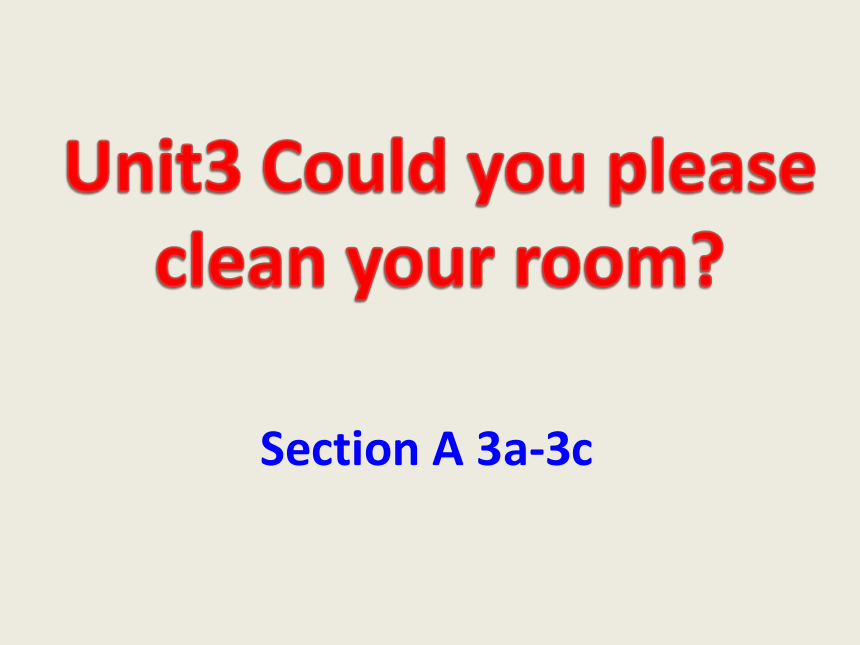 | |
| 格式 | zip | ||
| 文件大小 | 3.6MB | ||
| 资源类型 | 教案 | ||
| 版本资源 | 人教新目标(Go for it)版 | ||
| 科目 | 英语 | ||
| 更新时间 | 2022-02-10 13:02:49 | ||
图片预览

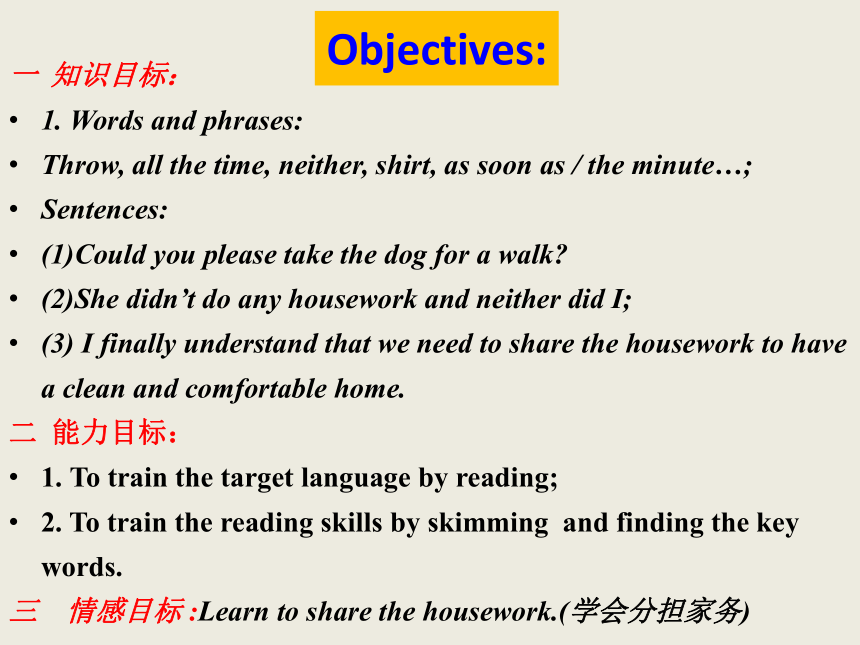
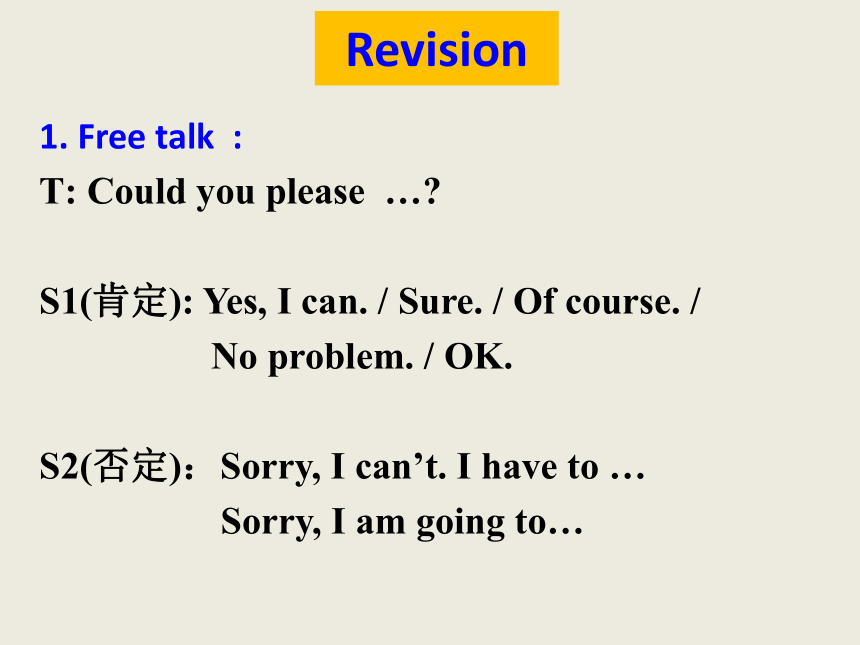
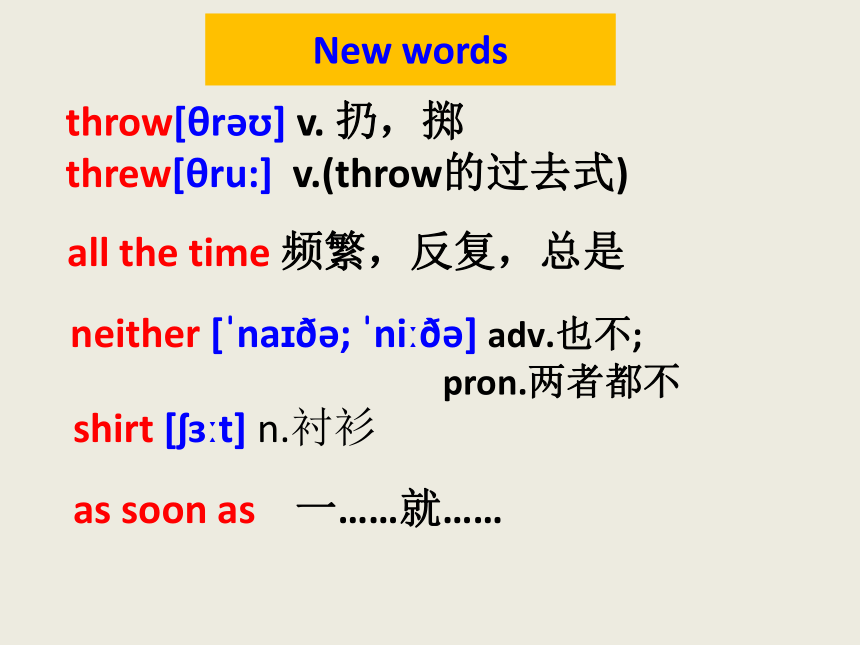
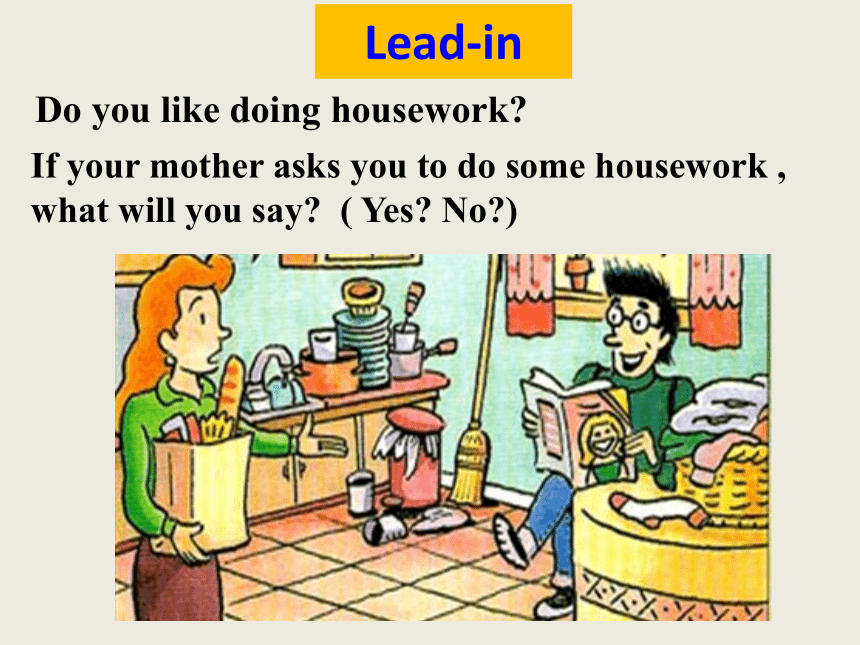
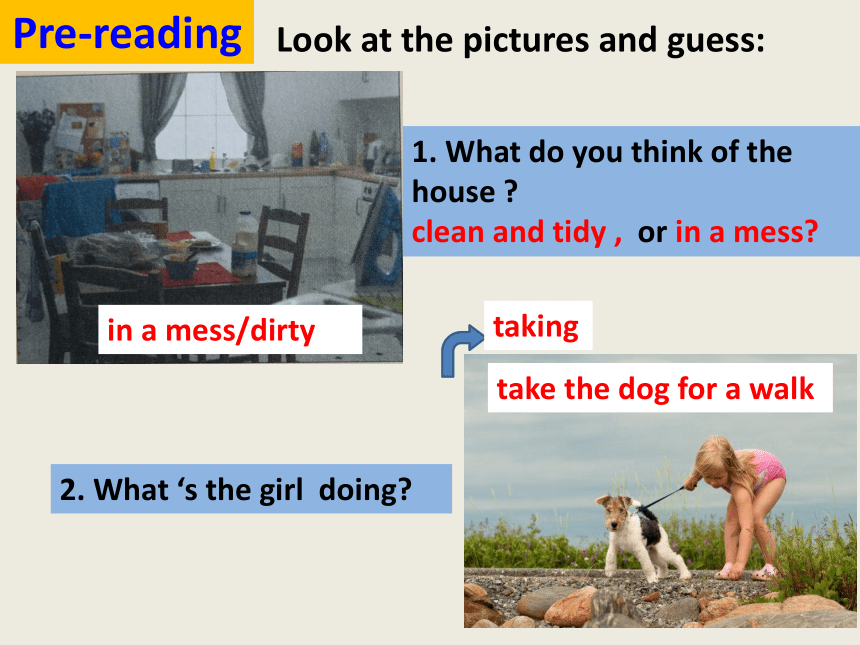
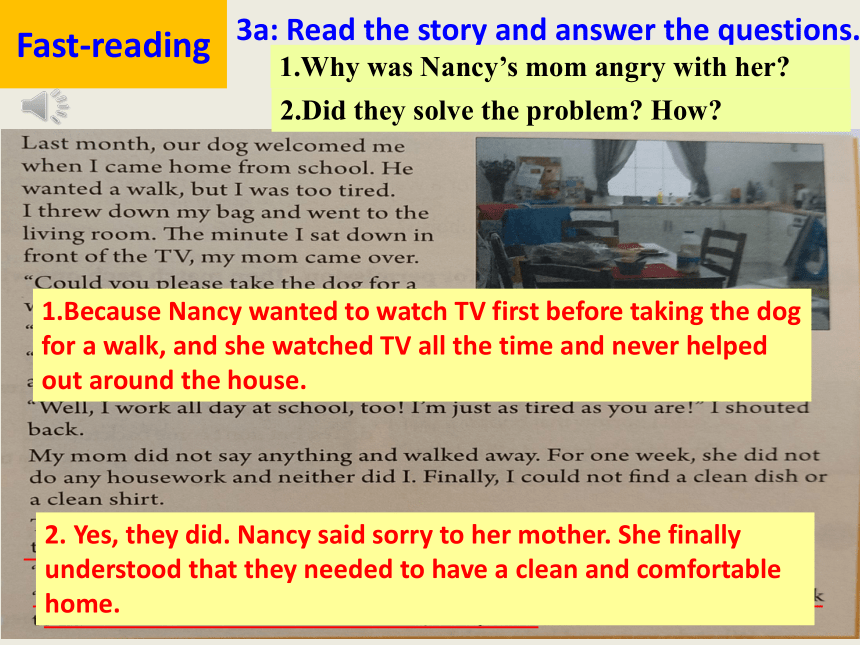
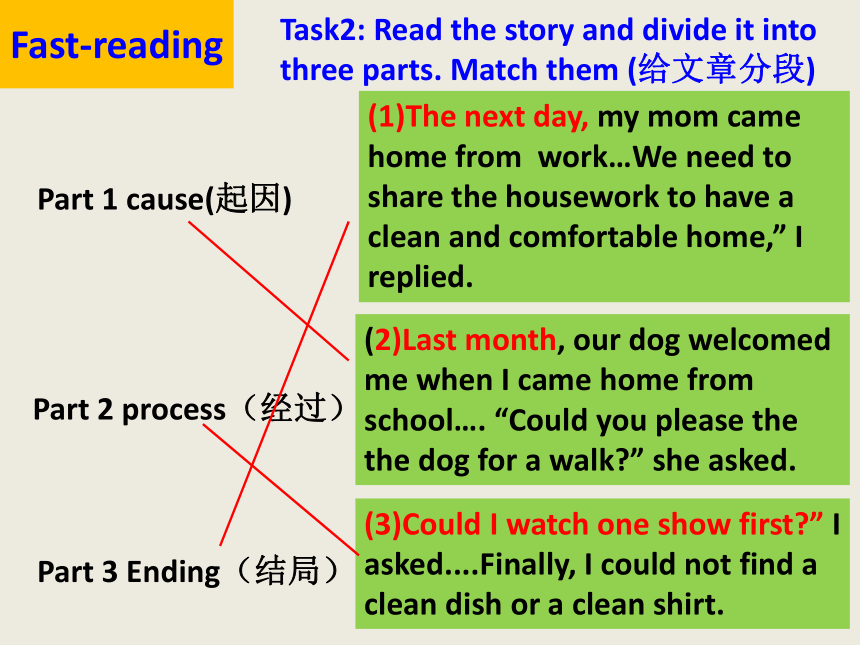
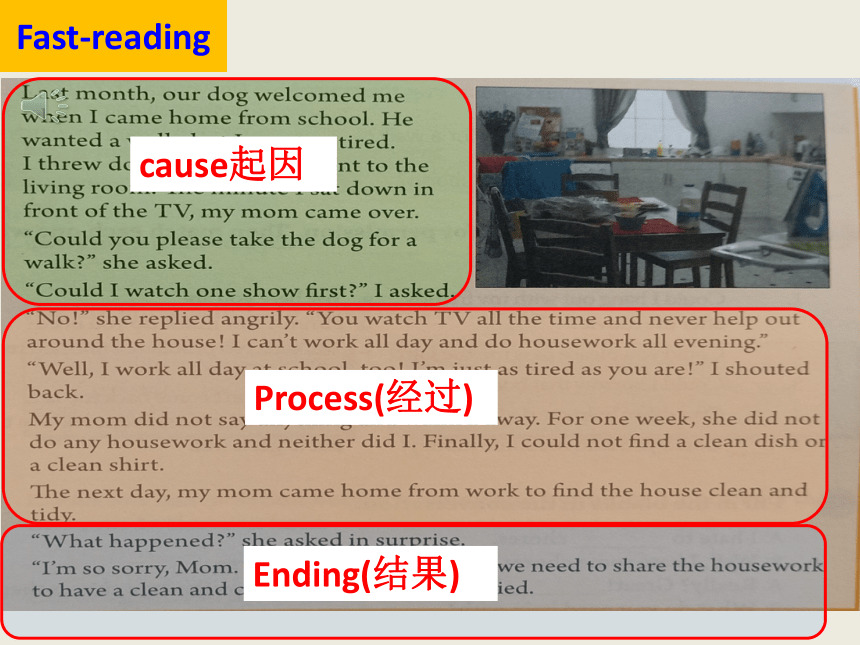
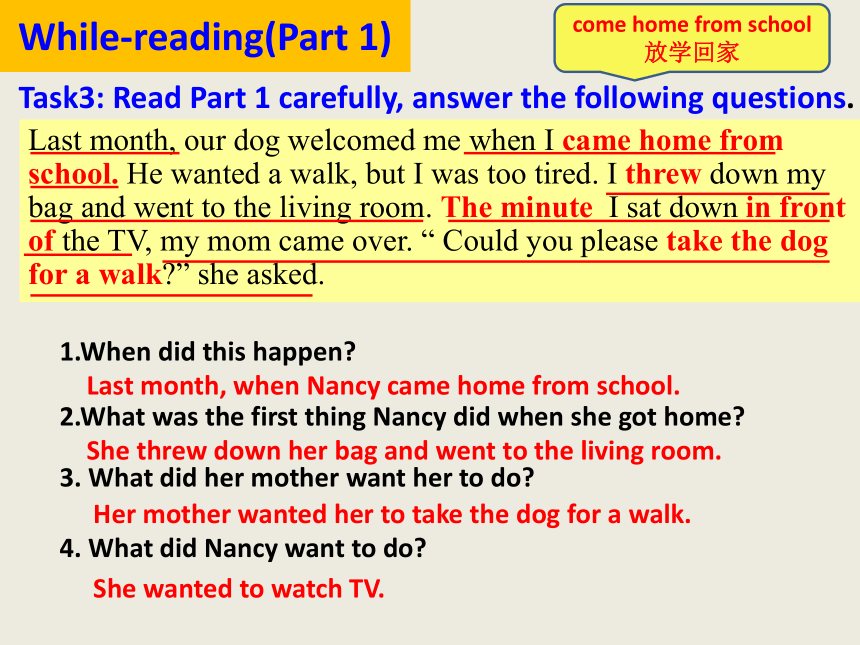
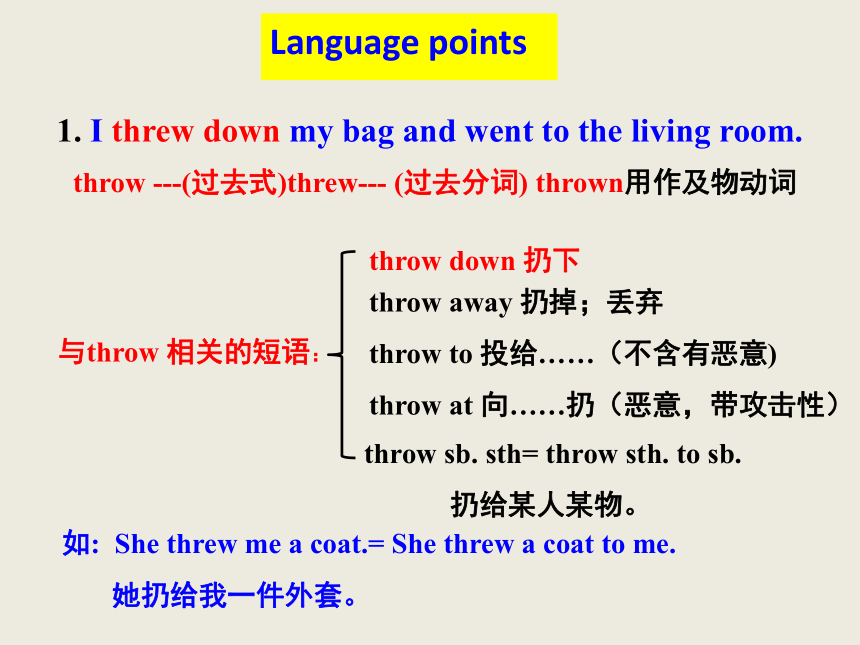
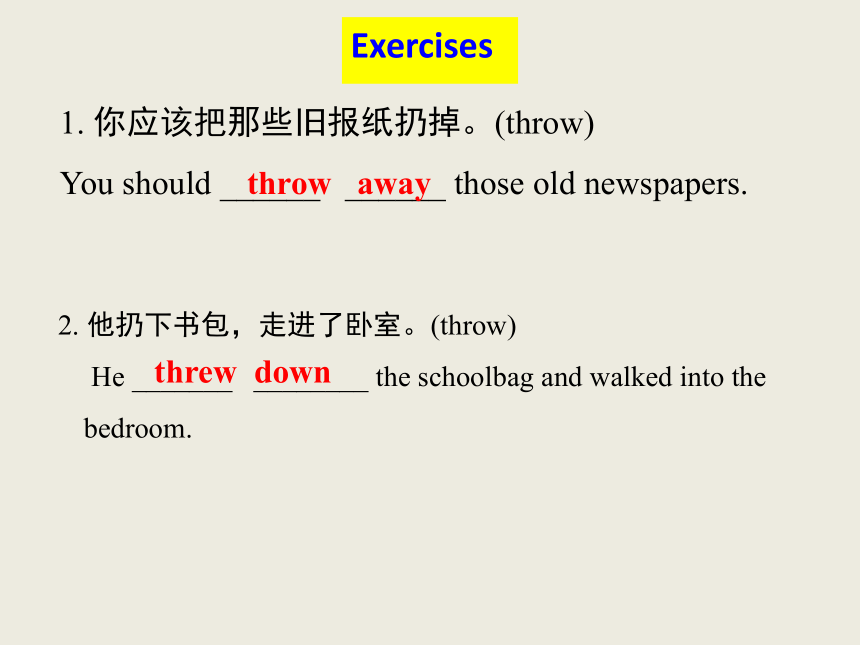
文档简介
(共33张PPT)
Unit3 Could you please
clean your room
Section A 3a-3c
Objectives:
一 知识目标:
1. Words and phrases:
Throw, all the time, neither, shirt, as soon as / the minute…;
Sentences:
(1)Could you please take the dog for a walk
(2)She didn’t do any housework and neither did I;
(3) I finally understand that we need to share the housework to have a clean and comfortable home.
二 能力目标:
1. To train the target language by reading;
2. To train the reading skills by skimming and finding the key words.
三 情感目标 :Learn to share the housework.(学会分担家务)
Revision
1. Free talk :
T: Could you please …
S1(肯定): Yes, I can. / Sure. / Of course. /
No problem. / OK.
S2(否定):Sorry, I can’t. I have to …
Sorry, I am going to…
throw[θr ] v. 扔,掷
threw[θru:] v.(throw的过去式)
all the time 频繁,反复,总是
neither [ na ; ni ] adv.也不;
pron.两者都不
shirt [ t] n.衬衫
New words
as soon as 一……就……
Do you like doing housework
Lead-in
If your mother asks you to do some housework , what will you say ( Yes No )
Pre-reading
Look at the pictures and guess:
1. What do you think of the house
clean and tidy , or in a mess
2. What ‘s the girl doing
take the dog for a walk
in a mess/dirty
taking
Fast-reading
3a: Read the story and answer the questions.
1.Why was Nancy’s mom angry with her
1.Because Nancy wanted to watch TV first before taking the dog for a walk, and she watched TV all the time and never helped out around the house.
2. Yes, they did. Nancy said sorry to her mother. She finally understood that they needed to have a clean and comfortable home.
2.Did they solve the problem How
Part 1 cause(起因)
Task2: Read the story and divide it into three parts. Match them (给文章分段)
Fast-reading
Part 2 process(经过)
Part 3 Ending(结局)
(1)The next day, my mom came home from work…We need to share the housework to have a clean and comfortable home,” I replied.
(2)Last month, our dog welcomed me when I came home from school…. “Could you please the the dog for a walk ” she asked.
(3)Could I watch one show first ” I asked....Finally, I could not find a clean dish or a clean shirt.
Fast-reading
cause起因
Process(经过)
Ending(结果)
Last month, our dog welcomed me when I came home from school. He wanted a walk, but I was too tired. I threw down my bag and went to the living room. The minute I sat down in front of the TV, my mom came over. “ Could you please take the dog for a walk ” she asked.
While-reading(Part 1)
Task3: Read Part 1 carefully, answer the following questions.
1.When did this happen
2.What was the first thing Nancy did when she got home
3. What did her mother want her to do
4. What did Nancy want to do
Last month, when Nancy came home from school.
She threw down her bag and went to the living room.
Her mother wanted her to take the dog for a walk.
She wanted to watch TV.
come home from school
放学回家
Language points
1. I threw down my bag and went to the living room.
throw ---(过去式)threw--- (过去分词) thrown用作及物动词
throw away 扔掉;丢弃
throw to 投给……(不含有恶意)
throw at 向……扔(恶意,带攻击性)
如: She threw me a coat.= She threw a coat to me.
她扔给我一件外套。
与throw 相关的短语:
throw sb. sth= throw sth. to sb.
扔给某人某物。
throw down 扔下
1. 你应该把那些旧报纸扔掉。(throw)
You should ______ ______ those old newspapers.
throw away
2. 他扔下书包,走进了卧室。(throw)
He _______ ________ the schoolbag and walked into the bedroom.
threw down
Exercises
Language points
2. The minute I sat down in front of the TV, my mom came over.
in front of 在…(外部)的前面
in the front of 在…(内部)的前面
eg. There is a dog ___________ the gate.
大门前面站着 一只狗。
The teacher’s desk is _____________ the classroom.
讲桌在教室的前面。
in front of
in the front of
知识点1:
the minute...一……就……
the minute 引导时间状语从句,相当于the moment 或as soon as。句子时态遵从“主将从现”原则。
eg: We will leave as soon as it stops raining.
=We will leave the minute it stops raining.
雨一停,我们就离开。
“主将从现”原则,即主句若为一般将来时,
从句则用一般现在时表示将来。
魔法记忆
Language points
主句,一般将来时
从句,一般现在时
知识点2:
根据汉语意思完成句子
1. 我一坐在电视机前面 , 妈妈就过来了。
________ ________I sat down in front of the TV, my mom came over.
= My mom came over ______ ______ ______ I sat down in front of the TV.
The minute
Exercises
as soon as
2.你最好一回家先做作业。 【2018 潍坊】
___________________________________________________________________________________________________________________________________________________________________________________________
(1)You'd better do your homework first as soon as you come back home.
(2)You’d better do your homework the minute you come back home.
While-reading(Part 2)
“Could I watch one show first ” I asked. “No!” she replied angrily. “You watch TV all the time and never help out around the house! I can’t work all day and do housework all evening.” “Well, I work all day at school, too! I'm just as tired as you are!” I shouted back.
My mom did not say anything and walked away. For one week, she did not do any housework and neither did I. Finally, I could not find a clean dish or a clean shirt.
Task4: Read Part 2 and fill in the blanks.
1.我几乎和你一样累!I’m just ___ _____ ___ you are!
2.整整一周,她没做任何家务,我也没做。
For ____ _____, she did not do any housework and _______ ___ ____.
3.你总是在看电视,从不帮忙打理家务。
You watch TV___ ____ ____ and never ____ ____ around the house.
as tired as
one week
neither did I
all the time
help out
reply—replied(v.)回答
angrily(adv.) 生气地
You watch TV all the time and never help out around the house.
all the time:(在该段时间内)频繁,反复,一直;
如: I do this all the time.
我一直是这么做的。
This happens all the time.
这种情况是时时发生的。
Language points
2. I’m just as tired as you are!
as ... as 意为 “和……一样” ,表示同级的比较。使用时要注意第一个as为副词,第二个as为连词。其基本结构为:as + adj./ adv. 原级+ as。
如:This film is as interesting as that one.
这部电影和那部电影一样有趣。
Your pen writes as smoothly as mine.
你的钢笔书写起来和我的一样流畅。
Language points
Danny said he was busy with schoolwork and was _______ tired _______ his mother.
A. so; as B. so; that C. as; than D. as; as
【点拨】so…as用于否定句中;as…as用于肯定句中,表示“与……一样”;so…that…如此……以至于……,引导结果状语从句;C项搭配有误。根据句意可知D项符合题意。
D
Exercises:
3. For one week, she did not do any housework and neither did I.
(1)neither 用作副词,意思是“也不”,表示后者跟前者情况一样,且都表达否定意义,此时也可用nor替换 neither 使用。画线分的句子因主谓语位置颠倒,称为倒装句。
— I don’t like this dress. 我不喜欢这件连衣裙。
— Neither / Nor do I. 我也不喜欢。
否定倒装句:Neither +be/情/助 +主语(某人也不)
倒装句结构
肯定倒装句:So + be/情/助 + 主语。(某人也是)
— I can speak English. 我会说英语。
— So can I. 我也会。
Language points
— Mary’s mother is a teacher. Mary的妈妈是老师。
— So am I. 我也是。
注意:否定neither肯定so,主语放在be/情/助之后。
— I can’t speak English.
我不会说英语。
— Neither can I. 我也不会。
(2) neither 也可用作限定词,意为“两者都不”,放在单数名词前。
eg: Neither student is from Canada.
两个学生都不是来自加拿大。
(3)neither of,neither 作代词,表示“两者都不”。也可单独用作宾语或主语。
eg: Neither of them is very clever, but both study
hard.他们两个都不是很聪明,但学习都挺刻苦。
(4)neither...nor... 既不……也不……,连接主语时,谓语动词遵循就近原则。
eg: Neither my father nor I am interested in the film.
我和我的父亲都对这部电影不感兴趣。
1.Mike didn't finish his homework.________.
A. Neither did Jim
B. Neither Jim did
C. So did Jim
D. So Jim did
A
2. My twin brothers promised my parents to give
up playing computer games, but _____ of
them made it.
A. none B. neither C. either D. both
B
Exercises:
The next day, my mom came home from work to find the house clean and tidy.
“What happened ” she asked in surprise.
“I’m so sorry, Mom. I finally understand that we need to share the housework to have a clean and comfortable home,” I replied.
While-reading(Part 3)
Task5: Read Part 3 and answer the three questions.
2.What did Nancy finally understand
1.Who did the chores at last
Nancy .
She finally understood that they need to share the housework to have a clean and comfortable home.
3. Why didn’t Nancy’s father do anything (answer is vary)
eg. (1) Because he was away from home/wasn’t at home.
(2) Because he didn’t live with them.
1. “What happened ” she asked in surprise.
他惊讶的问道:“发生什么事情了?”
in surprise介词短语,表示状态,意思是“吃惊
地, 惊讶地”。
Language points
eg: She looked at me in great surprise and asked, “What did you say just now ”
她极其惊讶的看着我,问道: “ 你刚才说什么?”
3b Read the sentences below. Underline the sentences
from the reading that mean the same thing.
Neither of us did any housework for a week.
2. My mom came over as soon as I sat down in front of
the TV.
3. You‘re tired, but I’m tired,too.
After-reading
For one week, she did not do any housework and neither did I.
The minute I sat down in front of the TV, my mom came over.
I’m just as tired as you are!
the minute= as soon as 一…就…
Summary
1. New vocabulary
last month, come over, take the dog for a walk,
all the time, the next day, neither did I
2. Important sentences
(1)The minute I sat down in front of the TV, my mom came over.
(2)For one week, she did not do any housework, and neither did I. I’m just as tired as you are!
对照目标,检查自己是否达成
Housework is for everyone in our family, we should share the housework to have a clean and comfortable home!
You must do:
1. 听3a音频,模仿跟读,理解背诵;
2.完成本课时听默写任务;
3. 完成《学习指要》3a-4c.
You can choose:
4. Clean your room today!
Homework
一、单项选择。
( ) 1. --- Could I read your new magazine, dad
--- ________. I’m reading it.
A. Yes, you could B. Sorry, you can’t
C. Yes, sure D. No, please
( ) 2. I can __________ my bed and __________ my clothes.
make; fold B. make; do
C. fold; do D. fold; wash
( ) 3. --- I don’t like doing chores.
--- _______________.
So do I B. Neither did I
C. Neither do I D. Neither I do
B
课 堂 小 测
A
B
( ) 4. --- Are your parents teachers
--- No, _____. They are both office workers.
both B. either
C. neither D. none
( ) 5. --- May I __________ this book
--- With pleasure. But you mustn’t _____ it to others.
A. borrow; lend B. lend; lend
C. lend; borrow D. borrow; borrow
( ) 6. --- Jim, __________ the rubbish when you leave home.
--- OK, mum.
A. bring out B. get out
C. take out D. find out
C
A
课 堂 小 测
C
neither/'na (r)/ adv.也不
知识点
3
表示前面陈述的否定情况也适于另一人
(物)时,常用“Neither/ Nor + be/助动词/情
态动词+主语.”这种倒装结构。
考向一
【重点】
eg: He doesn’t like sports, and neither do I.
他不喜欢体育运动,我也不喜欢。
表示前面陈述的肯定情况也适于另一人(物)时,常用“So + be/助动词/情态动词+主语.”这种倒装结构,表示“另一人(物)也如此。”
eg: —Jim can play the guitar. 吉姆会弹吉他。
—So can I. 我也会。
Thank you!
Unit3 Could you please
clean your room
Section A 3a-3c
Objectives:
一 知识目标:
1. Words and phrases:
Throw, all the time, neither, shirt, as soon as / the minute…;
Sentences:
(1)Could you please take the dog for a walk
(2)She didn’t do any housework and neither did I;
(3) I finally understand that we need to share the housework to have a clean and comfortable home.
二 能力目标:
1. To train the target language by reading;
2. To train the reading skills by skimming and finding the key words.
三 情感目标 :Learn to share the housework.(学会分担家务)
Revision
1. Free talk :
T: Could you please …
S1(肯定): Yes, I can. / Sure. / Of course. /
No problem. / OK.
S2(否定):Sorry, I can’t. I have to …
Sorry, I am going to…
throw[θr ] v. 扔,掷
threw[θru:] v.(throw的过去式)
all the time 频繁,反复,总是
neither [ na ; ni ] adv.也不;
pron.两者都不
shirt [ t] n.衬衫
New words
as soon as 一……就……
Do you like doing housework
Lead-in
If your mother asks you to do some housework , what will you say ( Yes No )
Pre-reading
Look at the pictures and guess:
1. What do you think of the house
clean and tidy , or in a mess
2. What ‘s the girl doing
take the dog for a walk
in a mess/dirty
taking
Fast-reading
3a: Read the story and answer the questions.
1.Why was Nancy’s mom angry with her
1.Because Nancy wanted to watch TV first before taking the dog for a walk, and she watched TV all the time and never helped out around the house.
2. Yes, they did. Nancy said sorry to her mother. She finally understood that they needed to have a clean and comfortable home.
2.Did they solve the problem How
Part 1 cause(起因)
Task2: Read the story and divide it into three parts. Match them (给文章分段)
Fast-reading
Part 2 process(经过)
Part 3 Ending(结局)
(1)The next day, my mom came home from work…We need to share the housework to have a clean and comfortable home,” I replied.
(2)Last month, our dog welcomed me when I came home from school…. “Could you please the the dog for a walk ” she asked.
(3)Could I watch one show first ” I asked....Finally, I could not find a clean dish or a clean shirt.
Fast-reading
cause起因
Process(经过)
Ending(结果)
Last month, our dog welcomed me when I came home from school. He wanted a walk, but I was too tired. I threw down my bag and went to the living room. The minute I sat down in front of the TV, my mom came over. “ Could you please take the dog for a walk ” she asked.
While-reading(Part 1)
Task3: Read Part 1 carefully, answer the following questions.
1.When did this happen
2.What was the first thing Nancy did when she got home
3. What did her mother want her to do
4. What did Nancy want to do
Last month, when Nancy came home from school.
She threw down her bag and went to the living room.
Her mother wanted her to take the dog for a walk.
She wanted to watch TV.
come home from school
放学回家
Language points
1. I threw down my bag and went to the living room.
throw ---(过去式)threw--- (过去分词) thrown用作及物动词
throw away 扔掉;丢弃
throw to 投给……(不含有恶意)
throw at 向……扔(恶意,带攻击性)
如: She threw me a coat.= She threw a coat to me.
她扔给我一件外套。
与throw 相关的短语:
throw sb. sth= throw sth. to sb.
扔给某人某物。
throw down 扔下
1. 你应该把那些旧报纸扔掉。(throw)
You should ______ ______ those old newspapers.
throw away
2. 他扔下书包,走进了卧室。(throw)
He _______ ________ the schoolbag and walked into the bedroom.
threw down
Exercises
Language points
2. The minute I sat down in front of the TV, my mom came over.
in front of 在…(外部)的前面
in the front of 在…(内部)的前面
eg. There is a dog ___________ the gate.
大门前面站着 一只狗。
The teacher’s desk is _____________ the classroom.
讲桌在教室的前面。
in front of
in the front of
知识点1:
the minute...一……就……
the minute 引导时间状语从句,相当于the moment 或as soon as。句子时态遵从“主将从现”原则。
eg: We will leave as soon as it stops raining.
=We will leave the minute it stops raining.
雨一停,我们就离开。
“主将从现”原则,即主句若为一般将来时,
从句则用一般现在时表示将来。
魔法记忆
Language points
主句,一般将来时
从句,一般现在时
知识点2:
根据汉语意思完成句子
1. 我一坐在电视机前面 , 妈妈就过来了。
________ ________I sat down in front of the TV, my mom came over.
= My mom came over ______ ______ ______ I sat down in front of the TV.
The minute
Exercises
as soon as
2.你最好一回家先做作业。 【2018 潍坊】
___________________________________________________________________________________________________________________________________________________________________________________________
(1)You'd better do your homework first as soon as you come back home.
(2)You’d better do your homework the minute you come back home.
While-reading(Part 2)
“Could I watch one show first ” I asked. “No!” she replied angrily. “You watch TV all the time and never help out around the house! I can’t work all day and do housework all evening.” “Well, I work all day at school, too! I'm just as tired as you are!” I shouted back.
My mom did not say anything and walked away. For one week, she did not do any housework and neither did I. Finally, I could not find a clean dish or a clean shirt.
Task4: Read Part 2 and fill in the blanks.
1.我几乎和你一样累!I’m just ___ _____ ___ you are!
2.整整一周,她没做任何家务,我也没做。
For ____ _____, she did not do any housework and _______ ___ ____.
3.你总是在看电视,从不帮忙打理家务。
You watch TV___ ____ ____ and never ____ ____ around the house.
as tired as
one week
neither did I
all the time
help out
reply—replied(v.)回答
angrily(adv.) 生气地
You watch TV all the time and never help out around the house.
all the time:(在该段时间内)频繁,反复,一直;
如: I do this all the time.
我一直是这么做的。
This happens all the time.
这种情况是时时发生的。
Language points
2. I’m just as tired as you are!
as ... as 意为 “和……一样” ,表示同级的比较。使用时要注意第一个as为副词,第二个as为连词。其基本结构为:as + adj./ adv. 原级+ as。
如:This film is as interesting as that one.
这部电影和那部电影一样有趣。
Your pen writes as smoothly as mine.
你的钢笔书写起来和我的一样流畅。
Language points
Danny said he was busy with schoolwork and was _______ tired _______ his mother.
A. so; as B. so; that C. as; than D. as; as
【点拨】so…as用于否定句中;as…as用于肯定句中,表示“与……一样”;so…that…如此……以至于……,引导结果状语从句;C项搭配有误。根据句意可知D项符合题意。
D
Exercises:
3. For one week, she did not do any housework and neither did I.
(1)neither 用作副词,意思是“也不”,表示后者跟前者情况一样,且都表达否定意义,此时也可用nor替换 neither 使用。画线分的句子因主谓语位置颠倒,称为倒装句。
— I don’t like this dress. 我不喜欢这件连衣裙。
— Neither / Nor do I. 我也不喜欢。
否定倒装句:Neither +be/情/助 +主语(某人也不)
倒装句结构
肯定倒装句:So + be/情/助 + 主语。(某人也是)
— I can speak English. 我会说英语。
— So can I. 我也会。
Language points
— Mary’s mother is a teacher. Mary的妈妈是老师。
— So am I. 我也是。
注意:否定neither肯定so,主语放在be/情/助之后。
— I can’t speak English.
我不会说英语。
— Neither can I. 我也不会。
(2) neither 也可用作限定词,意为“两者都不”,放在单数名词前。
eg: Neither student is from Canada.
两个学生都不是来自加拿大。
(3)neither of,neither 作代词,表示“两者都不”。也可单独用作宾语或主语。
eg: Neither of them is very clever, but both study
hard.他们两个都不是很聪明,但学习都挺刻苦。
(4)neither...nor... 既不……也不……,连接主语时,谓语动词遵循就近原则。
eg: Neither my father nor I am interested in the film.
我和我的父亲都对这部电影不感兴趣。
1.Mike didn't finish his homework.________.
A. Neither did Jim
B. Neither Jim did
C. So did Jim
D. So Jim did
A
2. My twin brothers promised my parents to give
up playing computer games, but _____ of
them made it.
A. none B. neither C. either D. both
B
Exercises:
The next day, my mom came home from work to find the house clean and tidy.
“What happened ” she asked in surprise.
“I’m so sorry, Mom. I finally understand that we need to share the housework to have a clean and comfortable home,” I replied.
While-reading(Part 3)
Task5: Read Part 3 and answer the three questions.
2.What did Nancy finally understand
1.Who did the chores at last
Nancy .
She finally understood that they need to share the housework to have a clean and comfortable home.
3. Why didn’t Nancy’s father do anything (answer is vary)
eg. (1) Because he was away from home/wasn’t at home.
(2) Because he didn’t live with them.
1. “What happened ” she asked in surprise.
他惊讶的问道:“发生什么事情了?”
in surprise介词短语,表示状态,意思是“吃惊
地, 惊讶地”。
Language points
eg: She looked at me in great surprise and asked, “What did you say just now ”
她极其惊讶的看着我,问道: “ 你刚才说什么?”
3b Read the sentences below. Underline the sentences
from the reading that mean the same thing.
Neither of us did any housework for a week.
2. My mom came over as soon as I sat down in front of
the TV.
3. You‘re tired, but I’m tired,too.
After-reading
For one week, she did not do any housework and neither did I.
The minute I sat down in front of the TV, my mom came over.
I’m just as tired as you are!
the minute= as soon as 一…就…
Summary
1. New vocabulary
last month, come over, take the dog for a walk,
all the time, the next day, neither did I
2. Important sentences
(1)The minute I sat down in front of the TV, my mom came over.
(2)For one week, she did not do any housework, and neither did I. I’m just as tired as you are!
对照目标,检查自己是否达成
Housework is for everyone in our family, we should share the housework to have a clean and comfortable home!
You must do:
1. 听3a音频,模仿跟读,理解背诵;
2.完成本课时听默写任务;
3. 完成《学习指要》3a-4c.
You can choose:
4. Clean your room today!
Homework
一、单项选择。
( ) 1. --- Could I read your new magazine, dad
--- ________. I’m reading it.
A. Yes, you could B. Sorry, you can’t
C. Yes, sure D. No, please
( ) 2. I can __________ my bed and __________ my clothes.
make; fold B. make; do
C. fold; do D. fold; wash
( ) 3. --- I don’t like doing chores.
--- _______________.
So do I B. Neither did I
C. Neither do I D. Neither I do
B
课 堂 小 测
A
B
( ) 4. --- Are your parents teachers
--- No, _____. They are both office workers.
both B. either
C. neither D. none
( ) 5. --- May I __________ this book
--- With pleasure. But you mustn’t _____ it to others.
A. borrow; lend B. lend; lend
C. lend; borrow D. borrow; borrow
( ) 6. --- Jim, __________ the rubbish when you leave home.
--- OK, mum.
A. bring out B. get out
C. take out D. find out
C
A
课 堂 小 测
C
neither/'na (r)/ adv.也不
知识点
3
表示前面陈述的否定情况也适于另一人
(物)时,常用“Neither/ Nor + be/助动词/情
态动词+主语.”这种倒装结构。
考向一
【重点】
eg: He doesn’t like sports, and neither do I.
他不喜欢体育运动,我也不喜欢。
表示前面陈述的肯定情况也适于另一人(物)时,常用“So + be/助动词/情态动词+主语.”这种倒装结构,表示“另一人(物)也如此。”
eg: —Jim can play the guitar. 吉姆会弹吉他。
—So can I. 我也会。
Thank you!
同课章节目录
- Unit 1 What's the matter?
- Section A
- Section B
- Unit 2 I'll help to clean up the city parks.
- Section A
- Section B
- Unit 3 Could you please clean your room?
- Section A
- Section B
- Unit 4 Why don't you talk to your parents?
- Section A
- Section B
- Unit 5 What were you doing when the rainstorm came
- Section A
- Section B
- Review of Units 1-5
- Unit 6 An old man tried to move the mountains.
- Section A
- Section B
- Unit 7 What's the highest mountain in the world?
- Section A
- Section B
- Unit 8 Have you read Treasure Island yet?
- Section A
- Section B
- Unit 9 Have you ever been to a museum?
- Section A
- Section B
- Unit 10 I've had this bike for three years.
- Section A
- Section B
